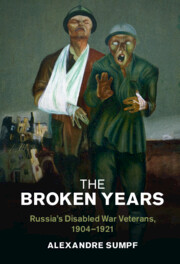Book contents
- The Broken Years
- Studies in the Social and Cultural History of Modern Warfare
- The Broken Years
- Copyright page
- Contents
- Figures
- Tables
- Acknowledgements
- Note on Usage
- Introduction
- 1 An Overwhelming Loss
- 2 The Right to Health
- 3 A Social Status Renegotiated by the War
- 4 Discriminatory Social Welfare
- 5 An Ephemeral Political Spring
- 6 The Devaluation of the War Experience
- Conclusion
- Bibliography
- Index
Conclusion
Published online by Cambridge University Press: 10 February 2022
- The Broken Years
- Studies in the Social and Cultural History of Modern Warfare
- The Broken Years
- Copyright page
- Contents
- Figures
- Tables
- Acknowledgements
- Note on Usage
- Introduction
- 1 An Overwhelming Loss
- 2 The Right to Health
- 3 A Social Status Renegotiated by the War
- 4 Discriminatory Social Welfare
- 5 An Ephemeral Political Spring
- 6 The Devaluation of the War Experience
- Conclusion
- Bibliography
- Index
Summary
With the First World War came a militarisation of society as well as the politicisation of war. While the conflict was on everybody’s minds and everybody’s lips, dictating its own pace and organisation of the national effort, its meaning was subject to debate within all sectors of Russian society. The Romanov dynasty and the military command used men who were fit for combat in order to achieve their imperialist aims. In return, these combatants, their families, and all the medical, economic, and social activists used the fact of being at war to force the state to acknowledge its social debt and force the autocracy to admit to the necessity of change. Now the Great War constituted a frontal assault on the body of the nation. While on the Russian scale of things, losses remained at acceptable levels in absolute numbers, they were striking down a specific segment of the population: the future pillars of the economy and pivotal figures for local communities. Among them stood out a group of men who, although they had not fallen on the battlefield, nor died or disappeared, gave rise to a singular, intimate grief.
- Type
- Chapter
- Information
- The Broken YearsRussia's Disabled War Veterans, 1904–1921, pp. 268 - 282Publisher: Cambridge University PressPrint publication year: 2022



